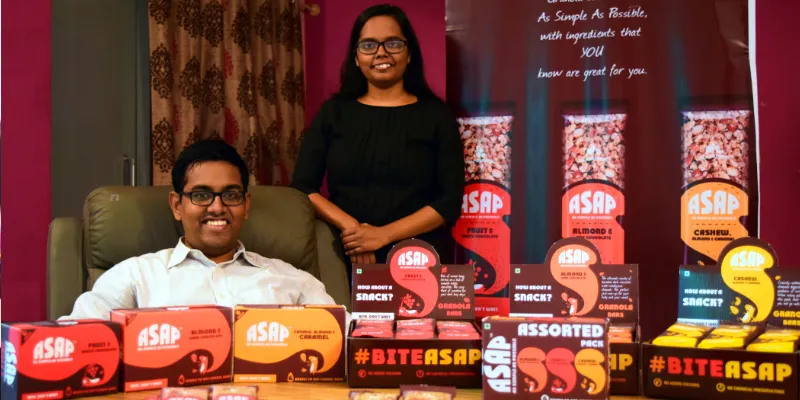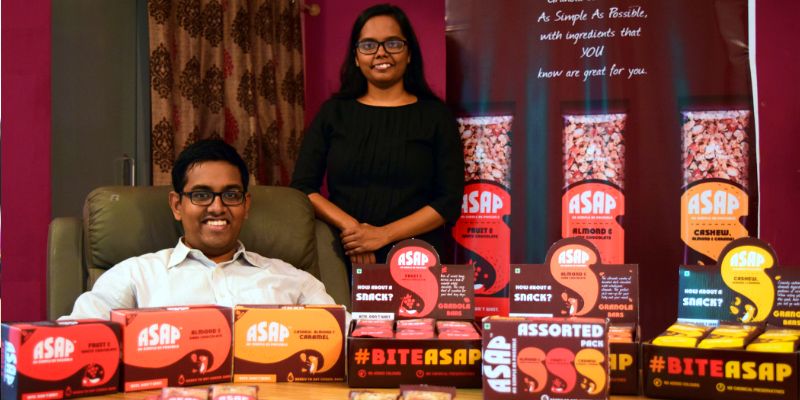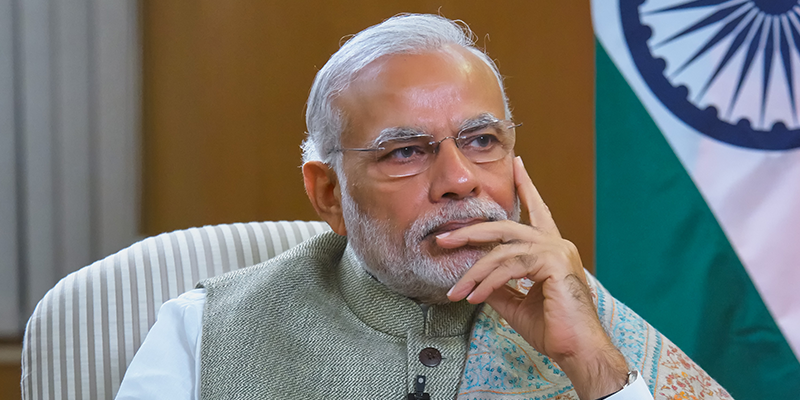2 foodies, 2 delicious products, 2 funding rounds: How WIMWI wants to rule your taste buds
The paths of two engineers from the southern and easternmost hubs of the country crossed at IIM Ahmedabad. Over restaurant crawls and long conversations about food, Shristi Shaw and Kanupradeep Subramanian conjured up a dream of building FMCG food brands based on the ideas that food need not be complicated to be healthy, and healthy food need not taste bland.

Some tasty opportunism
“Most of the urban workforce has a sedentary lifestyle, and yet, eats food designed for a labour-intensive day. Countries like the UK and Brazil had managed to engineer their food habits to better adapt to this indoor lifestyle, but the Indian diet still had large repositories of starch and carbs. We wanted to bridge this gap,” says Shristi.
Interestingly, WIMWI Foods is a tribute to IIMA, as it is actually an acronym for “Well-Known Institute of Management in Western India—something students and alumni often refer to the institution as.
Inspired to build an enterprise providing Indians with healthy food products, the gourmands decided to curate products from across the globe to make this process even more scintillating on the palate. WIMWI Foods was thus set up in March 2014, and shiitake mushrooms were their first product under the brand name Le Gourmetz, meaning ‘the foodies’.
Shiitake mushrooms, the jewel of oriental cuisine, are the second-most-consumed mushrooms globally and are rich in protein, B-complex vitamins, and dietary fibre, and when consumed regularly, reduce cholesterol, protect against multiple diseases, including cancer, through an active compound called lentinan.
Came, saw, conquered
As a team with a combined experience of zero years in the food industry, they foresaw two major challenges to building a self-sustainable business. The first was on the manufacturing side of things like capacity planning, capex management, batch planning, shelf-life management, and the most critical risk—the danger of underutilising capacity. The second hurdle they anticipated was in distribution—channel costs, working capital management, credit management, inventory management, pricing, and trade margins.
But the duo outsmarted the system with their first product and bought some time in understanding the supply chain. Dried shiitake mushrooms helped them test the waters and navigate the distribution challenges while almost entirely avoiding manufacturing obstacles. This was because they needed no processing except quality control and grading, hence reducing fixed assets; no for temperature control, thus streamlining storage and transportation which led to further reduction of fixed assets; they weren’t liquid, so no containers or tanks needed; and lastly, their long natural shelf life helped avoid processing steps like advanced packaging technology.
The first six months of their journey were spent in getting familiarised with the international supply chain and developing the marketing strategy for the product. “We worked with a number of chefs and visited a lot of hotels to design the right recipe book to suit the Indian palate,” says Shrishti.
FMCG crawl
They launched the mushrooms via the Hypercity chain mid-November 2014 in Mumbai, Hyderabad, Bengaluru, Ahmedabad, and in various stores across the country by early 2015. As word got around, they started seeing a steady growth in sales throughout 2015. Today, they sell through more than 200 stores in India.
The shiitake mushrooms project, as they had hoped, gave them major learnings. Besides market data the duo, by spending weekends inside stores with a brand kiosk to sample some cooked products made with the mushrooms, also struck up conversations with customers about their pain points when it came to healthy eating. “We were able to understand very clearly that snacking was a major generator of guilt when it came to eating. Most of the guilt was due to anecdotal inputs people receive (maida is bad) and over-indulgent flavours (death by chocolate). Further, snacks had very impulse-driven consumption where convenience was as critical as health and taste. This was perhaps the richest learning we took from the project,” explains Kanu.
Armed with their experience while retailing shiitake mushrooms—which was already one success story in the bag—they now decided to venture into manufacturing and setting up a brand in the snacking and quick-eating category, something they had come to feel strongly about. To start this new chapter, they raised seed funding from CIIE and a couple of Ahmedabad-based investors.
“In our minds, the mandate was clear—develop a snacking brand that offers a convenient eating experience without the guilt of snacking on unhealthy food,” he explains. With the funds raised, they moved operations to Bengaluru, set up a team, and got cracking on product development.
Round two
They zeroed in on granola bars as a powerful format for two reasons—they can fit anywhere and have simple ingredients that people can see, recognise, and understand.
They wanted just one look to be enough for customers to understand the ingredients. However, maintaining a shelf life of six months in transparent packaging without adding any preservatives or colours formed their next great challenge. “We invested in developing special packaging for our product and the results have been spectacular,” Kanu says.
They wished to coin a catchy name with a high level of recall, and ‘ASAP’—As Simple As Possible—ticked all boxes. They launched ASAP bars through Amazon.in in July 2016 and have grown month on month at an average rate of 34 percent in sales.
“ASAP Bars are a godsend because I tend to skip meals very often. It’s quick and healthy snack with simple ingredients, so, I don’t have to bother with packaged food,” says Radhika, a media professional who regularly consumes these bars.
With business growing fast, the need for working capital got direr. Last year was a difficult one for fundraising, as investment sentiment in startups was deeply pessimistic, according to Kanu. “A lot of food-tech startups and hyperlocal delivery shut shop at the end of 2015 and 2016. In this time, our strong business fundamentals—lean operations, in-house production, and a strong demand from consumers—helped us sail through,” he says.
Funding, ASAP
ASAP Bars’ success helped them close their pre-Series A round with two Chennai-based investors—Bhoovarahan Thirumalai and Gowri Subramanian—in November 2016. “Their innovative product line with a rare combination of talent, enthusiasm, and grounded nature in the management team is what attracted us to the company. And building a consumer product is such an exhilarating journey,” says Bhoovarahan.
They also gave an exit to all the seed round investors in this round.
Starting with just two people, their team is now 20-strong, and their product development still happens in-house. They have now cracked the in-flight catering menus of Air Asia, Air Vistara, and major domestic airports, and are among the bestsellers in the granola bars category on Amazon.in.
The duo tells us that the Indian health food market stood at Rs 10,000 crore in 2016, and currently contributes to 10 percent of the overall Indian market compared to the global average of 25 percent. “As far as eating habits go, it is debatable if one should work towards having a better infrastructure to support locally grown food, or procure the ‘best’ from outside but going purely by numbers, there is a market,” says Kanu.











